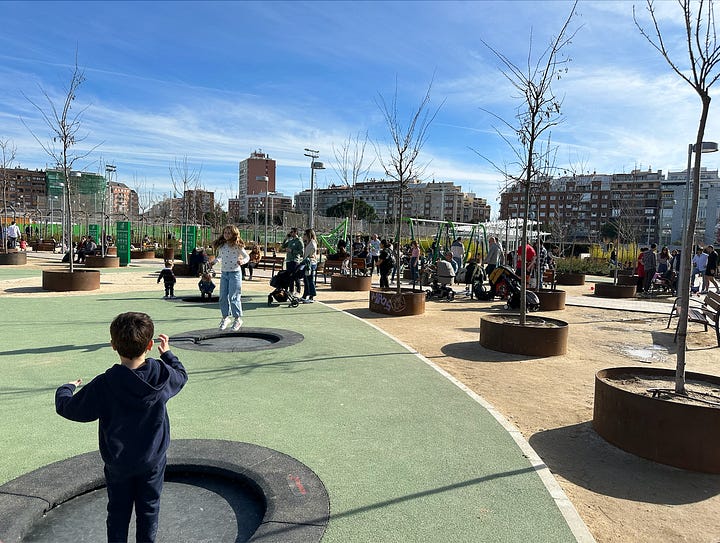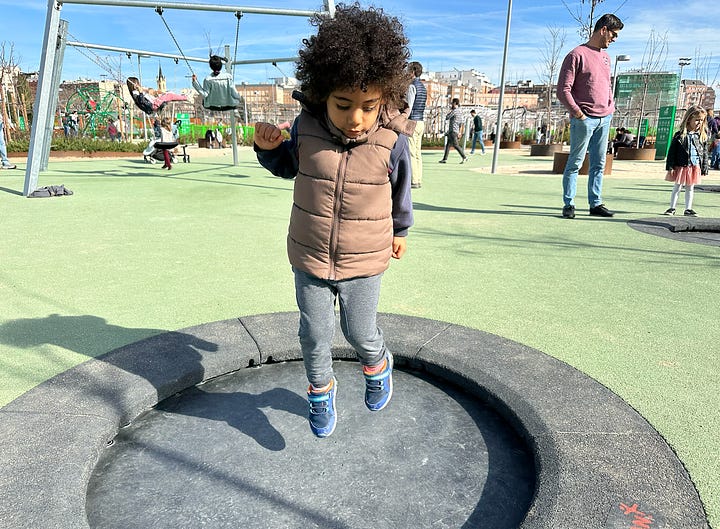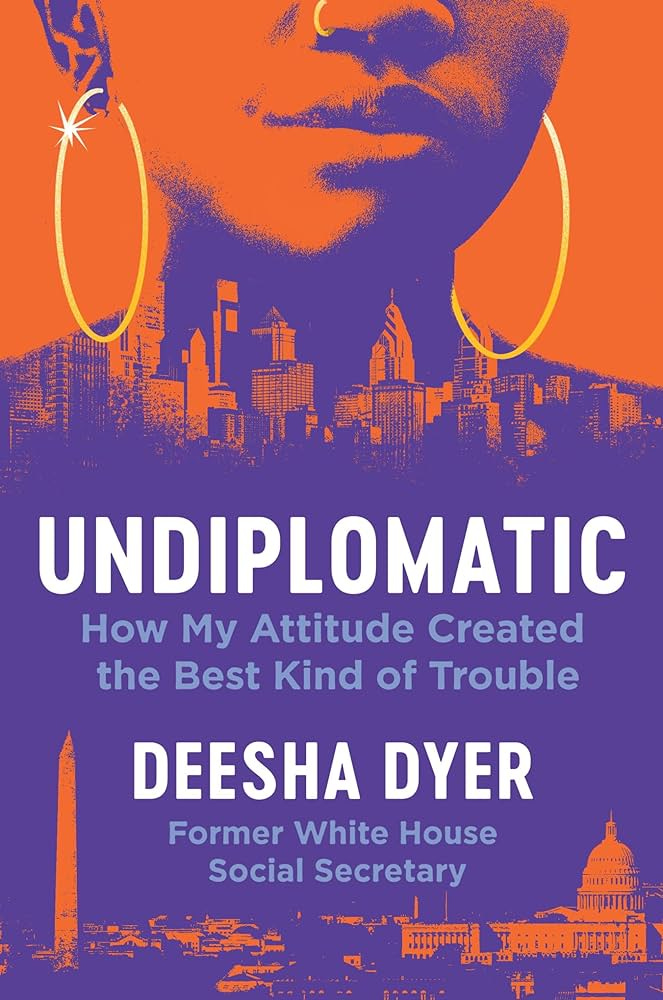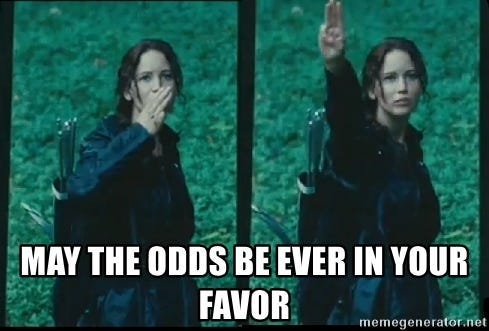What Are We All Bracing For? Playgrounds and the Power of Coffee
Overcoming Imposter Syndrome to Prepare for What's Coming....
I recently met an old colleague for coffee in D.C. The warm spring weather, gentle breeze, and blossoming trees adorned with red, white, and pink flowers contrasted with the sense of dread and urgency in our conversation.
"It took a while, but I finally got it," they said.
"Why do you need another passport?" I asked.
They explained that they needed an exit strategy. No matter who won, the elections would not end well. Other family members had already moved overseas.
"My retirement savings are in my home," they continued. "But I may need to sell it. How can I sell my home now?"
My mind was spinning. I had just moved back to the U.S. I hadn't even thought about selling the home I bought less than a year ago. Yet here I was, in another conversation where doom and dread loomed over us. But it's not just them. There’s a sense that something is coming, and people are bracing for it. It’s the feeling you get when there's dampness in the air and the wind's pattern changes right before a storm.
I recently read an article about how wealthy Americans were obtaining multiple citizenships, citing the risk of instability. Another article, just published by the Council on Foreign Relations, was titled “Preventing U.S. Election Violence in 2024.” With unrest on student campuses, incidents of self-immolation, and extreme threats exchanged between the left and the right, our country does feel like it is on the precipice of something concerning—almost as if it is under attack from within.
As a diplomat, I braced for what seemed to be the rise of authoritarianism globally when I was appointed, watching democracies become crippled while hoping my own continued as "the great experiment." But being overseas, I almost felt a sense of distance from the troubles of my own country and those of the countries I was in. It was as if I was neither here nor there.
But now, as a journalist again, I feel the urgency in the air. That feeling of tension when the weather is changing is up close and central. Yet, I don't have an exit strategy. I've been around the world, and there are not too many places better than my country.
Writing in the Age of Disinformation
I picked a great time to get back into journalism. The industry is as important as it is fraught (talk about being under attack from within). Layoffs are everywhere, but I have been lucky enough to scoop up a few freelance gigs and start exercising my skills again.
As part of my personal professional development as a writer and journalist, I’ve attended quite a few webinars on spotting, responding to, and building trust in this age of disinformation. (Here’s another upcoming event.) Disinformation is false information purposely spread to deceive people. And Houston, we have a problem.
One insight from a session I attended was that people are most susceptible to disinformation when they are passionate about the topic, and really, no one is immune. Talk about a prime time for disinformation to thrive.
As someone who grew up obsessed but simultaneously distrustful of news, I understand. I see how the flood of information and broken systems are further eroding our trust. And yes, journalists are human; they have feelings and perspectives that influence what and how things are covered. But their job is to try their best to get past themselves and find and defend the truth—even when that truth makes them uncomfortable.
As a writer, I have always believed in trying to meet people where they are. And that’s one of the ways experts say journalists can build trust with communities, by partnering with libraries, varying the medium of communication, or doing events with other trusted groups. As much as I love having the flexibility to work from home when I need to, I know doing my job well means I need to be accessible, present, and connect with others.
Unfortunately, content demands and staffing cuts have made it even harder for journalists to find the time and will to be out and about. But given the current reality of the writing industry, connecting is probably just as important for cutting through disinformation as the stories you're writing.
Where Are All the Public Playgrounds?


Speaking of getting out and into the community, since returning to the USA from Spain, another story I have wanted to cover is about public playgrounds. I live in a part of Maryland that is developing rapidly. The dust in the air and the gated-off mounds of sand signal buildings popping up everywhere. We live in a newer apartment building with our one- and three-year-old, along with several other small children, but it takes about 25 minutes to walk to the nearest public playground, a stark difference from Spain.
In Madrid, we became accustomed to nearly every other block featuring beautifully designed outdoor spaces for children, some even adjacent to outdoor restaurant seating, making it convenient for parents to get kids out of the house. Spain is a particularly unique kid-friendly country by design and practice. So when we returned to the dense suburbs of Washington, D.C., we were shocked by the lack of quality and availability of public playgrounds for city children.
For me, this type of story is a question of equity. Kids with homes or community centers often have safe, outdoor places to play like backyards. But what about kids in apartments? For kids who grow up in dense city areas, the availability of public playgrounds is essential. They need it for mental and physical health. What kind of equity gaps arise when some kids have a safe place to play and others don’t?
Career Moves - Get a Coffee




I talk a lot about networking. Recently, I've attended massive party-like networking events, award shows, and even clothing store openings. However, none have matched the one-on-one coffee meetings. I've spent a lot of time these last few weeks having coffee with people, and these meetings have significantly influenced my job offers and other types of opportunities.
There is something about meeting for coffee that allows people to let their guard down a bit. It enables people to open up. In my coffee meetings, I’ve discussed families, work environments, and many other topics that have fostered a deeper understanding between myself and others. These meetings have provided us an opportunity to learn the best ways to meet each other's needs. And as someone who is thoughtful about next steps, this has been a game changer. So if you are looking for new employment or trying to suss out a new career option, consider getting a cup of coffee with someone.
What I am Reading - Imposter Syndrome
I recently started a book called Undiplomatic by Deesha Dyer. I definitely judged this book by the cover because I knew I had to get it as soon as I saw it. I've only just started the book, so I’ll withhold any reviews until later, but the author opens up by talking about her struggles with imposter syndrome, a feeling experts describe as when high-achieving people feel like frauds. They say about 25-30 percent of high-achievers suffer from this.
It is so easy for minorities and women to slip into imposter syndrome. Part of this is self-inflicted through harsh self-criticism and low self-esteem, but society plays a huge role in amplifying it. It’s something I’ve had to fight against for years.
Both as a journalist and as a diplomat, people frequently tried to insinuate that I was a diversity hire, meaning I didn’t really have the credentials to deserve my position but was instead given it because of my race. At the U.S. Department of State, I was constantly being sized up. People asked what schools I attended (Baylor and Columbia University), whether I entered the department as part of a special program (no), and how many times I had to take the foreign service exam before I got in (once).
As a journalist, after I broke several stories that landed me as a finalist for the Livingston Award for Young Journalist and the Investigative Reporters and Editors Award, one of my colleagues told me, “You had a really lucky year.” Not that I deserved it, not that I had worked nights and weekends, not that I filed FOIAs every Friday or attended events and community meetings I didn’t have to, but that I was lucky.
These are the types of experiences that exacerbate imposter syndrome, leading people of color to believe that they are not qualified or good enough. That they don’t really deserve to be where they are when they do.
The complicating part is that, yes, sometimes race or other personal qualifiers do play a role in someone’s obtainment of a role. And this can be for any race, including white people. But why does a consideration of a certain personal qualifier diminish the other qualifications that make that someone good for a job?
On one of the coffees I recently had with a former colleague, I told her about the “lucky” comment and she responded, “Jenny, you don’t give 100%, you give 210%.” Then she went on to remind me about all the things I had done to tell the stories I told, things I even forgot I did. It was an important reminder and something I hope you as a reader remember as well.
These are trying times, and as we brace ourselves for what might be even more challenges on an individual and national level, it is important to remember everything we have done to get to where we are today. We aren’t “lucky.” We have worked hard and will continue to work every day for everything we hold dear.
Subscribe and Share
I hope you found this newsletter helpful and engaging. Please share with any friends or family you think would be interested and feel free to buy me a coffee by subscribing if you got some use out of it.
Follow me on Instagram too!





Hey Jenny - As someone who worked with you at EdSurge, please let me underscore: You *always* give 210%. :) "Luck" comes to those who earn it -- and you more than do your share.
Good morning! I'm a current FSO (but on leave without pay so a bit removed from the day-to-day), and your words really hit home today. I'm from a rural part of the country where emotions run high for a certain candidate, and that feeling of dread is omnipresent in my life. I feel so trapped, yet don't know where else to go. And heck- I really like this country and quite frankly my job. I also have kids- 3&5- and it isn't just the playgrounds. It seems the entire infrastructure is designed against having kids. Which feels like a slap in the face given all the recent laws criminalizing women's rights around reproductive health. I am moving to the DC area to live in an apartment soon, and I was shocked at how much they advertised all of their "dog-friendly" amenities (dog spa, dog park, dog treats in the lobby, dog wash center, etc. etc.) and yet there was NO mention of anything for kids. To me, owning an actual home in the DC area is an impossibility. I want a backyard for my kids, but I have to accept they won't actually get one. And the IRONY is that I currently live in an apartment that is part of a house, and the backyard is reserved for the owners who pretty much exclusively use it for their three large dogs. But finally- imposter syndrome. I have long struggled with this. I am from an area where less than 20% of kids at my high school go on to any further education, including tech/trade schools. My parents never had much money. I never felt like I belonged anywhere- I didn't belong in my small town, but I also didn't belong at college.... I still don't know how I ended up in the foreign service, but I took the test on a whim and like you I passed it on the first try. I didn't study foreign relations and I had no idea about the foreign service until a few months before I registered for the test. I'm now 13 years in, I was finally starting to feel like I belonged, and then I recently had a horrible experience and wasn't recommended for promotion. I was devastated. I am such a hard worker, and I had done so much under extremely stressful and dangerous conditions, and yet was told none of my work had value. Work that I had done for essentially my son's first year of life, missing out on so many key moments while I worked crazy hours. It brought me to my knees. Everything I had worked so hard for came crashing down, and now I was that hick poor kid trying to fit in once again. So many of us struggle with it. I can't wait to read that book! Thanks for these newsletters. They brighten up my inbox. Your article on racial gaslighting hit me like a ton of bricks. Thank you for speaking your truth and for recognizing how toxic State can be.